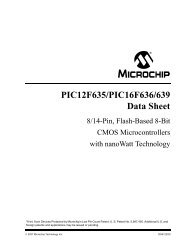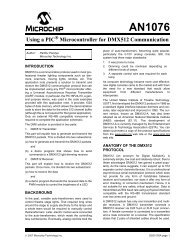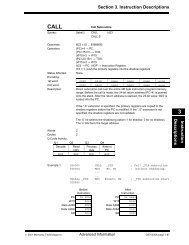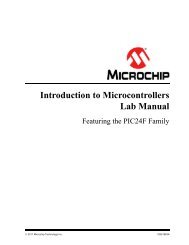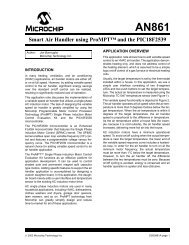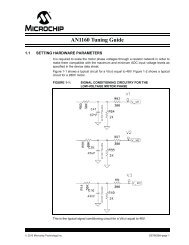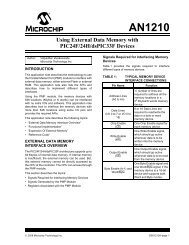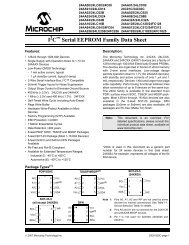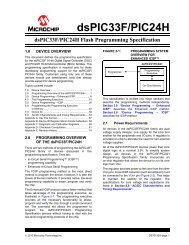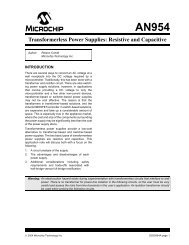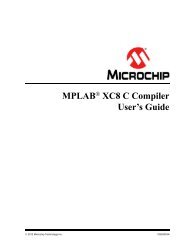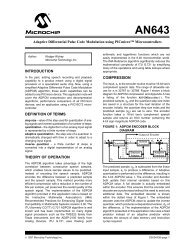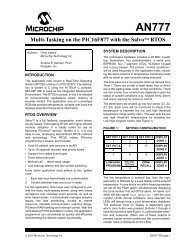MPLAB C Compiler for PIC24 MCUs and dsPIC DSCs ... - Microchip
MPLAB C Compiler for PIC24 MCUs and dsPIC DSCs ... - Microchip
MPLAB C Compiler for PIC24 MCUs and dsPIC DSCs ... - Microchip
Create successful ePaper yourself
Turn your PDF publications into a flip-book with our unique Google optimized e-Paper software.
16-Bit C <strong>Compiler</strong> User’s Guide<br />
extern int external_memory<br />
__attribute__((space(external(size(1024)))));<br />
Above an external memory of size 1024 bytes is defined. This memory can be uniquely<br />
identified by its given name of external_memory.<br />
6.4.2 Define Variables within an External Space<br />
The external space attribute is also used to assign individual variables to the space.<br />
This requires that the memory space declaration to be present. Given the declarations<br />
in the previous subsection, the following variable declarations can be made:<br />
__external__ int external_array[256]<br />
__attribute__((space(external(external_memory))));<br />
external_array will be allocated in the previous declared memory<br />
external_memory.<br />
Note that, like managed PSV pointers, we have qualified the variable with a new type<br />
qualifier __external__. When attached to a variable or pointer it instructs the compiler<br />
to generate the correct sequence <strong>for</strong> accessing.<br />
Now that a variable has been declared it may be accessed using normal C syntax. The<br />
compiler will generate code to access the variable via special helper functions that the<br />
programmer must define. These are covered in the next subsection.<br />
6.4.3 Define How to Access Memory Spaces<br />
References to variables placed in external memories are controlled via the use of several<br />
helper functions. Up to five (5) functions may be defined <strong>for</strong> reading <strong>and</strong> five (5) <strong>for</strong><br />
writing. One each of these is a generic function <strong>and</strong> will be called if any of the other four<br />
is not defined but is required. If none of the functions are defined, the compiler will generate<br />
an error message. A brief example will be presented in the next subsection. Generally<br />
defining the individual functions will result in more efficient code generation.<br />
6.4.3.1 FUNCTIONS FOR READING<br />
read_external<br />
void __read_external(unsigned int address,<br />
unsigned int memory_space,<br />
void *buffer,<br />
unsigned int len)<br />
This function is a generic Read function <strong>and</strong> will be called if one of the next functions<br />
are required but not defined. This function should per<strong>for</strong>m the steps necessary to fill<br />
len bytes of memory in the buffer from the external memory named memory_space<br />
starting at address address.<br />
read_external8<br />
unsigned char __read_external8(unsigned int address,<br />
unsigned int memory_space)<br />
Read 8 bits from external memory space memory_space starting from address<br />
address. The compiler would like to call this function if trying to access an 8-bit sized<br />
object.<br />
DS51284H-page 86 © 2008 <strong>Microchip</strong> Technology Inc.





